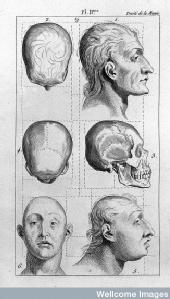Themes of Degeneration
TOPIC 12 (WEEK 4): INTRODUCTION
| This week we will survey degeneracy theory and its impact on psychiatric practice. Interest in degeneration emerged in the second half of the 19th century and was largely – though not exclusively – associated with the poor and social sub-strata, though there was also a great deal of interest in sexual degeneracy, notably homosexuality, concerns about race, and moral decline. Degeneracy theory had strong links with mental disorder, as well as sexual excess and ‘perversion’ and alcoholism, and was additionally associated with artistic sensitivities and deviance. Like neurasthenia, interest in degeneracy appeared to flourish in a particular cultural context and was associated with wider social anxieties. We will also explore how far theories and concerns about degeneracy fed into psychiatric practice and asylum management. In the second half of the seminar we will explore the problem of mental deficiency (as distinguished from mental illness or insanity), and eugenics, their influence in terms of institutional care and impact on psychiatric theory and practice. |
QUESTIONS
- How did theories of degeneration and heredity feed into and influence psychiatric practice?
- Why was there so much concern in the late 19th and early 20th centuries with racial decline and the rise in lunacy?
- Is degeneracy as much cultural as medical category?
- What impact did eugenics have on psychiatry and how did that vary in different national contexts?
READING
* Ian Dowbiggin, ‘Degeneration and Hereditarianism in French Mental Medicine 1840-90: Psychiatric Theory as Ideological Adaption’, Anatomy of Madness I, pp. 188-232.
* Robert Nye, Crime, Madness and Politics in Modern France (Princeton University Press, 1984). e-book
** Daniel Pick, Faces of Degeneration: A European Disorder, c. 1848-c.1918 (Cambridge University Press, 1989). e-book
* Ian Dowbiggin, ‘Back to the Future: Valentin Magnan, French Psychiatry, and the Classification of Mental Diseases, 1885-
* Ian Dowbiggin, Inheriting Madness: Professionalization and Psychiatric Knowledge in Nineteenth-Century France (University of California Press, 1991). Several copies in the library
* Ian Dowbiggin, The Quest for Mental Health: A Tale of Science, Medicine, Scandal, Sorrow, and Mass Society (Cambridge University Press, 2011). e-book
* Gayle Davis, ‘The Cruel Madness of Love’: Sex, Syphilis and Psychiatry in Scotland, 1880-1930 (Amsterdam and
* Harry Oosterhuis, Stepchildren of Nature: Krafft-Ebing, Psychiatry and the Making of Sexual Identity (University of Chicago Press, 2000).
* Ruth Harris, Murders and Madness: Medicine, Law, and Society in the fin de siècle (Oxford: Clarendon, 1989).
* Patricia E. Prestwich, ‘Drinkers, Drunkards, and Degenerates: The Alcoholic Population of a Parisian Asylum’, Histoire Sociale/Social History, 27 (nos. 53-4) (1994), 321-35. e-journal
* Patricia E. Prestwich, ‘Female Alcoholism in Paris, 1870-1920: The Response of Psychiatrists and of Families’, History of Psychiatry, 14 (2003), 321-36. e-journal
P. Rushton, ‘Lunatics and Idiots: Mental Disability, the Community and the Poor Law in North-East England, 1600-
David Wright, Mental Disability in Victorian England: The Earlswood Asylum 1847-1901 (Oxford University Press, 2001).
German Berrios and Roy Porter (eds), A History of Clinical Psychiatry (London: Athlone, 1995), ch. 9 ‘Mental Retardation’, pp. 212-51.
Martin Halliwell, Images of Idiocy: The Idiot Figure in Modern Fiction and Film (Aldershot: Ashgate, 2004).
** Mathew Thomson, The Problem of Mental Deficiency (Oxford: Clarendon, 1998). e-book
** Mark Jackson, The Borderland of Imbecility: Medicine, Society and the Fabrication of the Feeble Mind in Late Victorian and Edwardian England (Manchester University Press, 2000). e-book
** Mark Jackson, ‘Images of Deviance: Visual Representations of Mental Defectives in Early Twentieth-Century Medical Texts’, British Journal for the History of Science, 28 (1995), 319-37. e-journal
* Mathew Thomson, ‘Status, Manpower and Mental Fitness: Mental Deficiency in the First World War’, in R. Cooter, M. Harrison and S. Sturdy (eds), War, Medicine and Modernity (Stroud: Sutton, 1998), pp. 149-66.
* Mathew Thomson, ‘Social Policy and the Management of the Problem of Mental Deficiency in Inter-war London’, London Journal, 18 (1993), 129-42.e-journal
* Pam Dale, ‘Implementing the 1913 Mental Deficiency Act: Competing Priorities and Resource Constraint Evident in the South West of England before
Harvey Simmons, ‘Explaining Social Policy: The English Mental Deficiency Act of
* Louise Westwood, ‘Care in the Community of the Mentally Disordered: The Case of the Guardianship Society, 1900-1939’, Social History of Medicine 20 (2007), 57-72. e-journal
Jan Walmsley, Dorothy Atkinson and Sheena Rolph, ‘Community Care and Mental Deficiency 1913 to
Mathew Thomson, ‘”Though ever the Subject of Psychological Medicine”: Psychiatrists and the Colony Solution for Mental Defectives’, in 150 Years of British Psychiatry II, pp. 130-43.
Stephen Watson, ‘Malingerers, the “Weakminded” Criminal and “Moral Imbecile”: How the English Prison Medical Officer became an Expert in Mental Deficiency, 1880-
EUGENICS
* Richard A. Soloway, Demography and Degeneration: Eugenics and the Declining Birthrate in Twentieth-Century Britain (University of North Carolina Press, 1990). e-book
* Martin S. Pernick, The Black Stork: Eugenics and the Death of ‘Defective’ Babies in American Medicine (Oxford University Press, 1996). e-book
* Ian Dowbiggin, Keeping America Sane: Psychiatry and Eugenics in the United States and Canada (Cornell University Press, 1997). e-book
* Michael Burleigh, Death and Deliverance: ‘Euthanasia’ in Germany 1900-1945 (Cambridge University Press, 1994).
* Paul Weindling, Health, Race and German Politics between National Unification and Nazism 1870-1945 (Cambridge University Press, 1989). e-book


